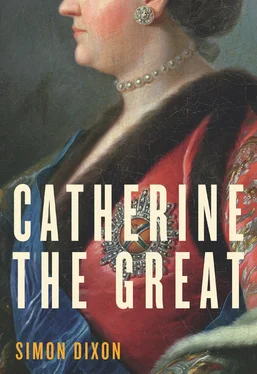* * *
Catherine’s so-called Greek project—a visionary plan to recreate the Byzantine empire under Russian domination, first formulated in detail between 1780 and 1782—was the logical culmination of a foreign policy whose intellectual foundations had been laid more than a decade earlier during Russia’s war against the Ottomans. Whereas the Prussian alliance (still formally in existence) had been the linchpin of Panin’s Northern System, this reorientation towards the south dictated the need for a rapprochement with Austria, a policy firmly supported by Potëmkin. So when Joseph II suggested a meeting in 1780 as an extension of his tour of Galicia, Catherine readily accepted. Her journey to Mogilëv in Belorussia would not only build bridges with her southern neighbour, but also give her the opportunity to test the impact of her Provincial Reform in lands acquired in the first partition of Poland and governed since 1775 by her old friend Zakhar Chernyshëv. 53
Accompanied by Alexander Lanskoy, she set off from Tsarskoye Selo supported by an entourage including her secretary, Alexander Bezborodko, the rising star of her administration, and Alexander Stroganov, who had returned from France in December 1779 talking about nothing but Paris. 54Even such a small suite was expensive. As Elizabeth Dimsdale learned from Catherine’s apothecary, ‘at every stage they had four hundred and forty horses and twenty coaches besides other carriages’. There were fifty-two of those, drawn by animals requisitioned from some 177 provincial towns. More than 60,000 roubles had been spent on sprucing up the wooden ‘palaces’ along the route. 55
The expedition got off to a bad start at Pskov, a medieval stronghold now in terminal decline. ‘Inoculate someone with your talent for development and send him here,’ Catherine appealed to Grimm: ‘Perhaps he will be able to bring on its industry.’ 56‘Tomorrow we move on,’ Bezborodko noted on 15 May, ‘having seen much that is not good among the nobles, merchants and others.’ 57As they advanced south-westward towards Poland, another disconcerting phenomenon was revealed at Polotsk: ‘Jesuits and Dominicans etc., and Jews all lined up on parade.’ To Catherine, the Jews looked ‘horribly filthy’ while the others made ‘an august masquerade’ to greet her ceremonial entry to the town. 58‘Everyone lives jumbled together here,’ she observed, unwittingly encapsulating one of the most awkward problems facing her administrators’ attempts to standardise the government of the empire: ‘Orthodox, Catholics, Uniates, Jews etc., Russians, Poles, Finns, Germans, Courlanders—there are not two people dressed the same who speak the same language correctly.’ 59Stroganov, who had started out with a terrible cold, improved after being purged in Polotsk. His ‘main task in each town’, as he explained to his son’s tutor on 20 May, was to discover from the local authorities ‘and even the simple citizens’ what their needs were, how justice was administered and about ‘the unfortunates who languish in prison’:
As soon as I have informed the empress, if the crimes are not capital, the prison doors open and her largesse is distributed to all those in genuine need. Apart from here, where the schools are on a fairly good footing thanks to the Jesuits, education is everywhere badly neglected. The empress wants to take effective measures to repair this deficiency which requires a prompt remedy. 60
At lunch on 21 May, Zakhar Chernyshëv brought out the treasured silver service presented to him as Governor General after the Provincial Reform. That evening he threw a ball for 500 guests: ‘I should never finish if I named them all,’ Catherine boasted to Paul and Maria Fëdorovna. 61Next morning, she was up early for the sixty-mile drive to Sennoye, where she realised that the emperor had already beaten her in the mock race for Mogilëv: ‘When he learned that I had lopped off four days from my schedule to overtake him, he ran night and day and overtook me by two days.’ 62Suppressing the urge to join him immediately, Catherine stuck to her schedule. On 23 May she drove through a landscape resembling one of her favourite English gardens to meet Field Marshal Rumyantsev at Shklov, the estate to which Zorich had retired to dispense hospitality on a heroic scale. Guests came from as far away as the two capitals to act in his theatre and there was always a place at his table for ‘Frenchmen, Italians, Germans, Serbs, Greeks, Moldavians, Turks—in a word, every kind of riff-raff and tramp’. 63To greet this exceptional vagrant, he had built his own triumphal arch, where he formally welcomed the empress at 6 p.m. But Zorich’s day had passed. Catherine may never even have set eyes on the Saxon dinner service on which he was said to have spent 50,000 roubles since she retired early to write to her ‘loving friend’, Potëmkin. Leaving her entourage to indulge themselves (and their host) at Zorich’s ball and banquet, she drifted off to sleep to the sound of fireworks exploding on an obelisk inside the house and music from a Jewish band dressed in Turkish costume. 64
Next morning, leaving her deflated former lover clutching at nothing more than the promise of a return visit, Catherine set off to face a potentially tricky week at Mogilëv. Joseph had as always insisted on travelling without ceremony, and his eccentric incognito posed troubling problems of etiquette:
I don’t know how best to arrange a meeting without others present because, when I get back from mass, people will be milling all around me. To postpone it again until after dinner would be discourteous. Perhaps he could come when everyone is at mass with me, so that when I get back to my inner apartments—those before my bedroom, that is—I shall find him already there. Tell me if you find a better way, though this one seems clever enough. Since Count Rumyantsev writes that our guest doesn’t wish to dine anywhere, I can only conclude that he doesn’t even want to eat with me at the high table; I shall wait to be informed about this. 65
In the event, though disconcerted to find that Joseph looked nothing like his portraits, she found him as determined to please her as she was to admire him. In spite of the weather—there had been thunder in the air since she left Polotsk and the fireworks had to be cancelled because of the rain—Chernyshëv had spared no expense to impress his guests, fetching Caterina Bonafini from St Petersburg to sing in the new theatre. 66Disappointed to find that Joseph did not know the abbé Galiani, Catherine nevertheless recognised that he was ‘clever’ and liked to talk. 67Conscious that all Europe was hanging on their every word, she teased Grimm that the emperor had said many things worth publishing that would have to remain confidential. One topic for serious discussion was elementary schooling (it was Joseph, acting on the recommendation of Abbot Felbiger, who sent Jankovich to Russia in 1782). During mass at the Catholic cathedral, however, the two monarchs behaved with characteristic irreverence, ‘laughing and talking more than we listened, with him as the cicerone and me as the gaping tourist’. 68‘You will find him less boring than the king of Sweden, mark my words,’ Catherine assured her son. 69
Though she became less respectful towards ‘Caesar’ when he proved to be a feeble general, it suited her to cast herself in a supporting role in 1780. As Harris reported from St Petersburg, ‘the amiable qualities of the emperor seem particularly calculated to suit a sovereign, who possesses the art of pleasing in so eminent a degree’. 70Alarmed by the progress of events, the Prussians redoubled their efforts to discredit Joseph in Catherine’s eyes. She was not to be taken in. ‘You would do very little justice to the character of the empress of Russia,’ Harris commented, ‘if you supposed she admitted all this trash to dwell upon her mind, or that she was not enlightened enough to see the motives of such a language.’ 71The visit of the Prussian Crown Prince also backfired. Though he provided Catherine with a welcome excuse to absent herself from the Alexander Nevsky liturgy for the first time in her reign, Frederick William was otherwise a resounding flop—cold, awkward and hard to like, even when he lost 500 roubles at a single game of cards. ‘If his uncle ever went wrong in his political speculations,’ Bezborodko remarked, ‘then he should count this visit among his greatest mistakes.’ 72By contrast, Count Cobenzl had found a perfect advocate for the Habsburg cause in the forty-five-year-old Prince de Ligne, a rakish cosmopolitan charmer with a penchant for the sorts of contrived witticism that Catherine loved best. Ligne, she duly reported to Grimm, was ‘one of the easiest and most agreeable beings I have ever met; he is truly original, thinks profoundly and performs follies like a child’. 73
Читать дальше












